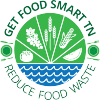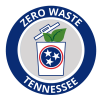Waste
Waste management and waste reduction are important aspects of sustainability because the impact of waste in the United States is significant. The U.S. is one of the largest generators of waste globally, with millions of tons of waste produced each year. Improper waste management can lead to environmental pollution, resource depletion, and increased greenhouse gas emissions. Landfills and incineration facilities have implications for local communities, including potential health risks and environmental injustices. However, by prioritizing waste reduction, recycling, and sustainable waste management practices, the United States can minimize its waste impact and move towards a more sustainable and circular economy.
The Office of Sustainable Practices has two programs that focus on education and outreach regarding waste reduction in multiple aspects.
Food Waste
Food waste is an environmental, economic, and social issue. In the U.S. 40 percent of the food produced goes uneaten and sent to the landfill and $218 billion is spent on growing, processing, transporting, and disposing on food that is never eaten. The majority of this food waste is still good for consumption and could be given to those who are food insecure. In Tennessee, 1 in 7 Tennesseans are food insecure.

Through the Get Food Smart TN program, we provide education and resources to help Tennesseans reduce food waste, donate food, and compost. Below are a few resources. For more information, visit getfoodsmarttn.com.
Source Reduction is the first step to reducing food waste.
Food date labels can be confusing. Understanding what they mean can reduce food waste.
Did you know you are legally protected to donate food? Learn more in this infographic.
Farmers can collect crop insurance and remain protected against liability while allowing gleaning.
Zero waste is a philosophy and approach that aims to minimize the amount of waste generated and sent to landfills or incinerators. It focuses on redesigning systems and processes to eliminate waste generation, promote recycling and reuse, and maximize resource efficiency. The goal of zero waste is to create a circular economy where resources are conserved, materials are reused or recycled, and waste is minimized.
Zero waste is important in sustainability as it conserves natural resources, reduces environmental impact, contributes to climate mitigation, promotes a circular economy, offers economic opportunities, and fosters social responsibility. It provides a holistic approach to waste management that aligns with the principles of sustainability and aims to create a more resource-efficient and environmentally conscious society.

The Zero Waste TN program is designed to help inform Tennesseans on how to make better choices and rethink the way we manage waste. Through the Zero Waste TN program, we provide education and resources to help Tennesseans make more conscious waste decisions. Below are a few resources. For more information, visit our Zero Waste TN webpage.
This Page Last Updated: September 4, 2025 at 2:47 PM